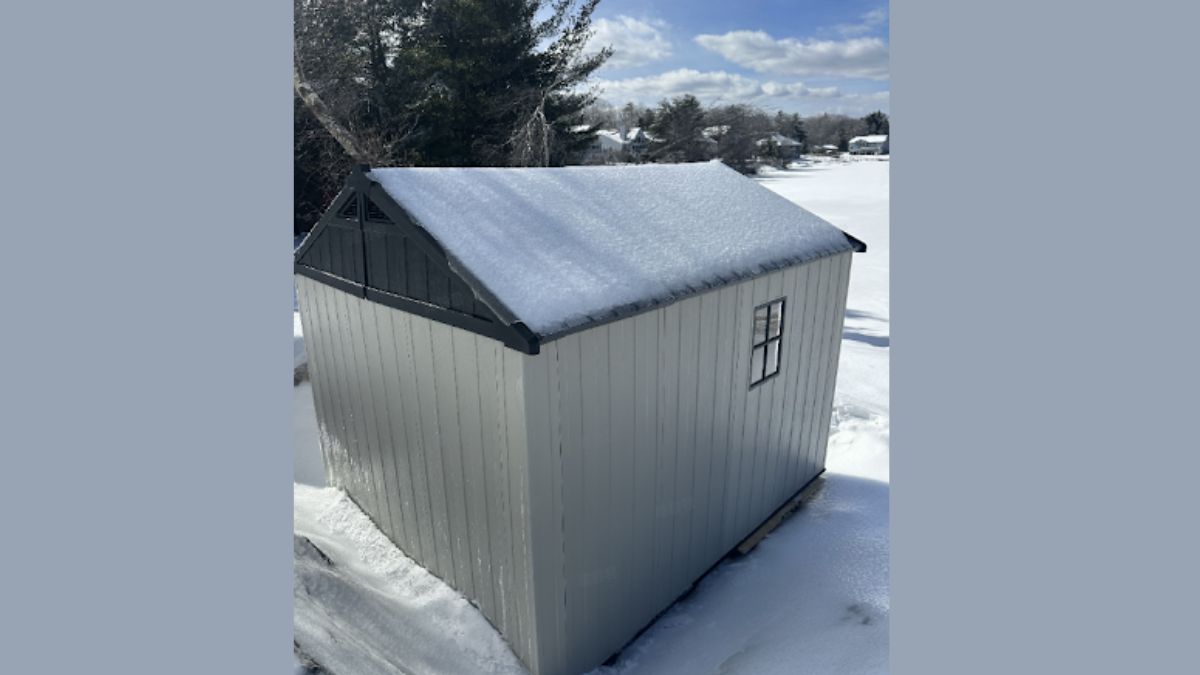When it comes to outdoor storage, your shed’s ability to withstand harsh weather conditions is a critical factor. For those living in colder climates, choosing the right shed to protect tools, equipment, and personal items becomes especially important during winter months. While there are many types of sheds on the market, insulated plastic sheds and other models vary in how they perform in cold weather. This article will explore how different shed types fare in colder weather, focusing on insulated plastic sheds and the benefits of choosing a Patiowell shed for ultimate protection.
Why Cold Weather Matters for Outdoor Storage
In colder climates, snow, ice, and freezing temperatures can pose significant threats to the integrity of a shed and its contents. Here are some of the ways cold weather can impact your shed:
- Moisture Build-Up: Freezing temperatures can cause moisture to freeze, leading to water damage or mold buildup in your shed.
- Structural Damage: Materials such as wood and metal can warp or become brittle in extreme cold, potentially leading to structural issues.
- Condensation: Fluctuating temperatures can cause condensation inside the shed, which can damage items stored inside, especially electronics, fabrics, and tools.
Choosing the right shed type, with proper insulation and weather-resistant properties, is key to preventing these issues.
1.Insulated Plastic Sheds
Insulated plastic sheds are one of the best options for those dealing with colder weather conditions. These sheds are designed with insulation built into the walls, providing a barrier that helps regulate temperature and protect your items from extreme cold.
Key Benefits of Insulated Plastic Sheds in Cold Weather:
- Thermal Insulation: The insulation in plastic sheds helps maintain a more stable internal temperature, keeping the inside of the shed warmer than the outside during cold weather. This can protect sensitive equipment and prevent freezing temperatures from damaging your items.
- Moisture Control: Insulated plastic sheds tend to be more resistant to condensation. The insulation reduces the chances of moisture buildup, which can cause mold, rust, or rot inside the shed.
- Energy Efficiency: If you’re using the shed as a workspace during winter months, an insulated plastic shed can make a huge difference in keeping the temperature comfortable without relying heavily on heating devices.
At Patiowell, we offer high-quality insulated plastic shed designed to withstand colder climates, providing you with the peace of mind that your belongings are safe and secure all year round.
2.Wooden Sheds
Wooden sheds are a popular choice for many homeowners because of their aesthetic appeal and traditional look. However, in colder climates, wood can be a less-than-ideal choice for outdoor storage.
Challenges in Cold Weather:
- Moisture Damage: Wood absorbs moisture from the air, which can cause it to expand and contract as temperatures fluctuate. This can lead to warping, cracking, or rotting over time, especially in areas where snow and ice are common.
- Insulation Needs: Wooden sheds often lack proper insulation unless you add it yourself, which can be costly. Without insulation, wooden sheds can become very cold inside, increasing the risk of damage to temperature-sensitive items.
While wooden sheds can be customized and insulated, they require more maintenance and care to ensure they hold up during the cold months.
3.Metal Sheds
Metal sheds, typically made from galvanized steel or aluminum, are another popular option for outdoor storage. These sheds are highly durable and provide excellent security. However, when it comes to colder weather, there are a few important considerations.
Cold Weather Performance:
- Heat Conduction: Metal sheds are prone to conducting cold temperatures, which can cause the interior of the shed to drop to near freezing temperatures. This can be especially problematic for items that are sensitive to cold.
- Condensation Issues: The metal surface of these sheds can create condensation inside, which may lead to rust or mold buildup. The lack of insulation in metal sheds exacerbates this issue.
- Durability in Extreme Cold: While metal sheds are generally durable, they can become brittle in extremely low temperatures, especially if the metal is not of high quality.
If you choose a metal shed for cold climates, it’s essential to add insulation or choose a shed with built-in insulating features to ensure it can withstand winter conditions.
4.Wood-Plastic Hybrid Sheds
Hybrid sheds, which combine wood and plastic materials, offer some of the benefits of both materials. The structure is typically made from a wood frame with plastic or resin walls, offering a balance of strength, aesthetics, and weather resistance.
Cold Weather Considerations:
- Better Insulation: The combination of wood and plastic can provide better insulation than a purely wood shed. However, it still may not offer the same level of protection against cold temperatures as an insulated plastic shed.
- Moisture Resistance: The plastic material helps prevent moisture damage, but the wood framing can still be susceptible to issues like rotting or warping in extreme cold if not properly sealed and maintained.
Hybrid sheds offer a middle ground, but for colder climates, an insulated plastic shed remains the top choice.
5.Vinyl Sheds
Vinyl sheds are made from a durable, low-maintenance plastic material that is resistant to the elements. Like insulated plastic sheds, vinyl sheds are often used for storing outdoor gear, but they differ in terms of insulation.
Performance in Cold Weather:
- Moisture Resistance: Vinyl sheds are highly resistant to moisture, making them an excellent option for preventing rust or mold buildup.
- Lack of Insulation: Unlike insulated plastic sheds, standard vinyl sheds may not offer the same level of temperature regulation. Without insulation, these sheds can become very cold inside during winter months, which may not be ideal for temperature-sensitive items.
While vinyl sheds are durable and require little maintenance, adding insulation or using them for less sensitive storage is recommended in colder climates.
Conclusion: Why Choose a Patiowell Shed for Cold Weather
When selecting a shed for colder weather, it’s important to consider the material, insulation, and overall construction. At Patiowell, we specialize in providing high-quality insulated plastic sheds that are designed to handle extreme weather conditions, including freezing temperatures and snow. Our sheds offer exceptional insulation, moisture control, and durability, ensuring that your items stay protected all year round.
Whether you need a shed for storing tools, outdoor gear, or seasonal items, choosing an insulated plastic shed from Patiowell is the best way to ensure that your storage solution performs well during colder weather. Explore our range of products today and find the perfect shed for your needs!
Stay protected, stay organized, and trust Patiowell for all your outdoor storage needs, no matter the season.














